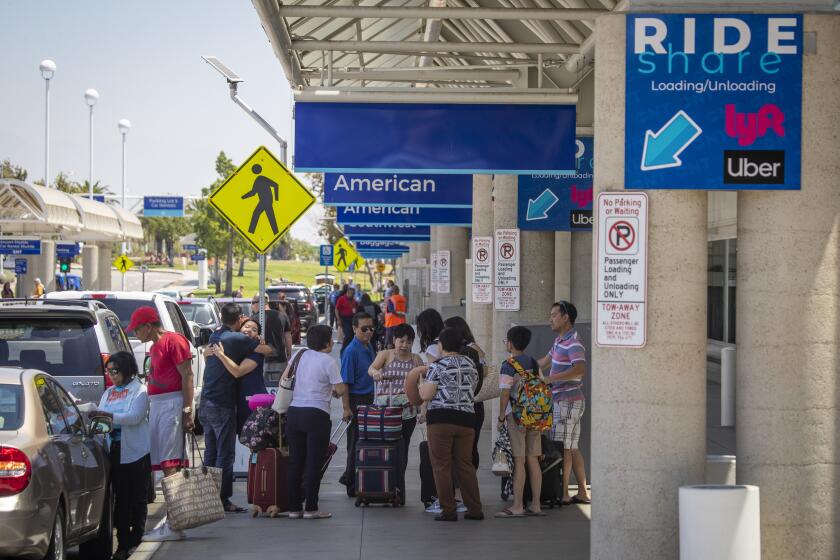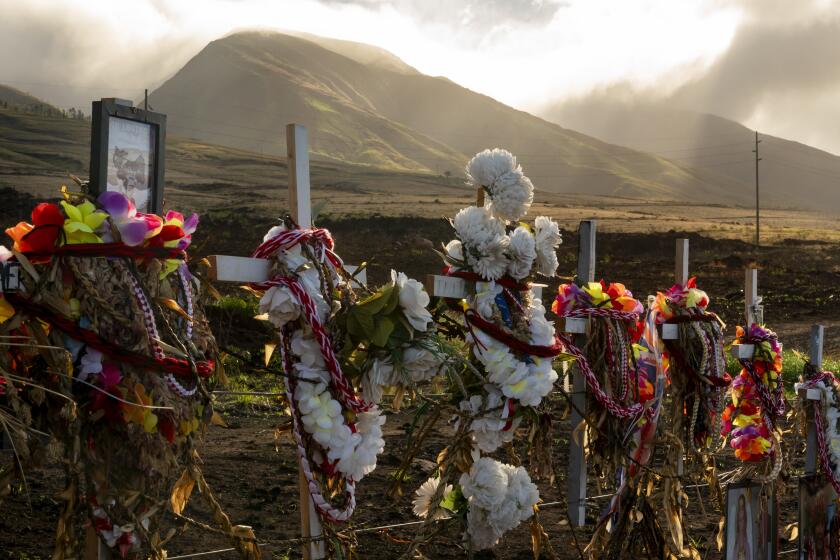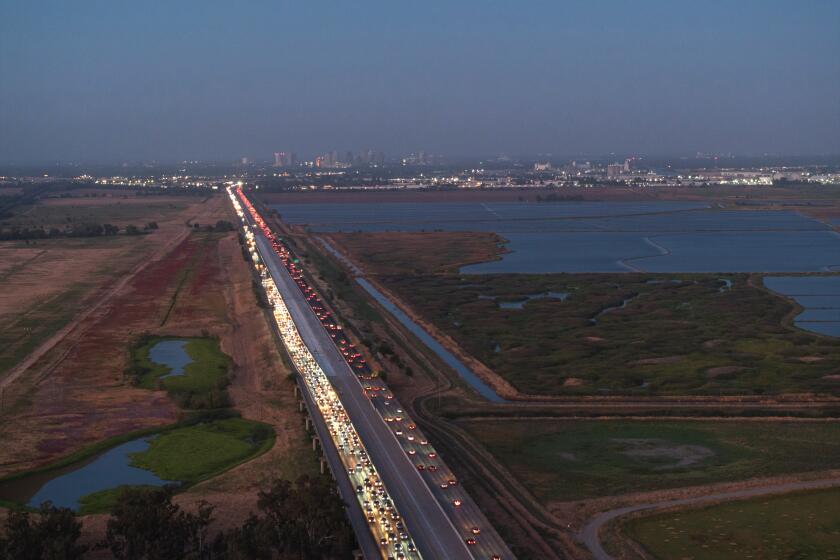LAX Ban on Soliciting Rejected by High Court : Justices Say Rule Goes Too Far in Limiting Free Speech; Larger Question of Exclusion Ignored
The Supreme Court on Monday unanimously struck down a ban on soliciting at Los Angeles International Airport, concluding that the regulation went too far in limiting the right to free speech.
The ban on all “First Amendment activities” in the airport terminal could be read to “prohibit even talking and reading or the wearing of campaign buttons or symbolic clothing,” Justice Sandra Day O’Connor said for the court. “No conceivable governmental interest would justify such an absolute prohibition of speech.”
But the justices, focusing on the wording of the LAX resolution, ignored the larger question of whether governments have the authority to exclude solicitors from airports.
Special Facilities
In the city’s view, the case raises the question of whether airport hallways are akin to city sidewalks--and thus are always open to free speech and soliciting--or whether they are special government facilities that can be tightly regulated.
For more than a decade, the city’s Board of Airport Commissioners has tried repeatedly but unsuccessfully to find a legal way to keep unwanted solicitors and pamphleteers out of LAX terminals. About 42 million people a year pass through the facility, the world’s third-busiest airport, and city officials say they should have the authority to keep out anyone who is not there to aid travelers.
In the past, lower federal courts have rejected policies crafted by LAX and other airports nationwide that appeared to discriminate against certain groups. “You can’t let in the Girl Scouts and try to keep out the Hare Krishnas,” one lawyer said in citing the reasoning used in these rulings.
Then, in an effort to avoid such discrimination in its regulations, the airport declared that the terminal area “is not open for First Amendment activities by any individual or entity.” This policy, adopted in 1983, was designed to keep out all persons who do not aid travelers, rather than attack solicitors who block halls or harass passengers.
The justices derided airport officials for this policy, which they ruled was so broadly worded that it was clearly unconstitutional, regardless of how it was applied.
“Under such a sweeping ban,” O’Connor said, “virtually every individual who enters LAX may be found to violate the resolution by engaging in some First Amendment activities,” including talking to friends or buying a newspaper.
Barry A. Fisher, a Los Angeles attorney who represented the group, Jews for Jesus, in opposing the airport policy, said that the justices have affirmed, in their decision Monday, a series of lower court rulings that say soliciting may be regulated but not prohibited.
“Frankly, what these groups are doing (soliciting) isn’t any impediment to the traveling public,” Fisher said. “This is just their latest effort against these groups, even though they don’t have any factual justification for it. And the bottom line is that you can’t have a categorical prohibition like this one.”
Issue Unresolved
The assistant city attorney who represented the Los Angeles airport board before the high court said he was disappointed by the decision. “They didn’t resolve the issue of whether government can limit the use of its facilities,” attorney James R. Kapel said.
Chief Justice William H. Rehnquist and Justice Byron R. White carefully noted in a separate statement that the court did not decide this issue, leaving the question open until it receives another case that specifically addresses this point.
Kapel noted that the airport has not tried to enforce its ban on soliciting since it was struck down by a federal court in 1984. He also would not predict whether the airport board would try again to find a legal policy to keep out solicitors.
The five-member Board of Airport Commissioners is appointed by the mayor and can issue regulations not subject to approval by the city government.
Free Literature
This case arose in July, 1984, several weeks before the start of the Olympic Games, when an airport officer told Avi Snyder, a minister for Jews for Jesus, that he could not pass out free religious literature in the airport.
Although no legal action was taken against him, Snyder sued, contending that the policy was blatantly unconstitutional. A federal District Court agreed, and in 1986 the U.S. 9th Circuit Court of Appeals affirmed that ruling (Board of Airport Commissioners vs. Jews for Jesus, 86-104).
Jews for Jesus, a Christian evangelistic society, was incorporated in 1973 to “proclaim Jesus the Messiah,” according to Tuvya Zaretsky, a spokesman for the San Francisco-based organization. With a staff of 104, Jews for Jesus also has major branches in Los Angeles, New York, Boston, Chicago and Toronto.
Zaretsky said in a telephone interview that the group’s distribution of tracts at Los Angeles International and other airports around the country had not abated during the litigation. “It has not affected our work in any way,” he said. “Airports are a significant venue for us. . . . To speak to people where they are is central to our work.”
In a second case decided on similar grounds, the justices threw out a Houston ordinance that made it a crime for a bystander to “interrupt any policeman” while he was busy. In the case, a gay activist was arrested for making a “verbal challenge” to a police officer who was arresting another person.
On an 8-1 vote, the high court said the ordinance was too broad and allows the city to “criminalize a substantial amount . . . of constitutionally protected speech.” Rehnquist dissented in the case (Houston vs. Hill, 86-243).
More to Read
Start your day right
Sign up for Essential California for news, features and recommendations from the L.A. Times and beyond in your inbox six days a week.
You may occasionally receive promotional content from the Los Angeles Times.







